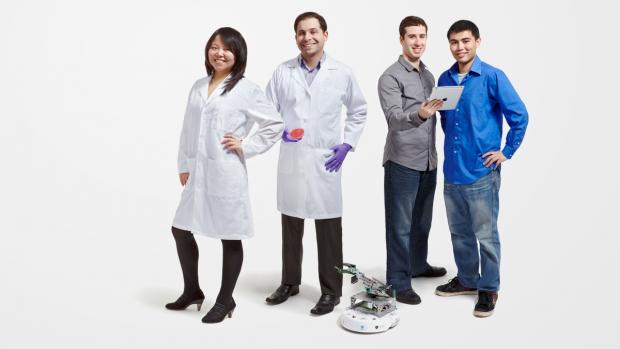Sing to Me, O Mentor!
This year's Inno/Vention contestants talk about the secret ingredient to success.

Step one of creating something iconic — an epic poem, a visual masterpiece, even a rock song — has, for centuries in Western culture, meant invoking the muse. What’s step one for university students seeking a spot in the global pantheon of twenty-first century creative heroes, where leaders are more likely to be technologists and entrepreneurs than poets and painters? It may be invoking a mentor.
Participants in the Polytechnic Institute of New York University’s (NYU-Poly) Time Warner Cable Inno/Vention student idea competition have inspiration in spades. Many of them hatched the concept for their submissions long before signing up to compete. What they and many successful startup founders and inventors will likely tell you is that to create a commercially viable product or service, you need a mentor to guide you.
Mentors “can push you to explore outside of your comfort zone and discover new ideas while keeping you on the right track,” said Yangzi (Isabel) Tian, an Inno/Vention finalist. The NYU-Poly junior will pitch her idea for a cancer-fighting gene therapy using nanodiamonds to Inno/Vention’s jury of investors and business leaders on April 5.
Tian and her fellow Inno/Vention students have been working with faculty mentors on everything from identifying potential customers to solving complex technical problems. The guidance is much like what business incubators, including NYU-Poly’s own, offer new ventures.
“Before I met with my mentor, I wasn't very confident about whether my idea was plausible from an industry point of view,” says Tian. “I wanted a mentor who had experience working in both the research and industry of biomedical science, so that he or she could give me honest opinions and constructive criticism.”
She describes her mentor, Kalle Levon, an NYU-Poly professor of chemical and biological science who has helmed a biotech startup, as “the perfect match.”
For Sumit Dahal, a freshman at NYU Abu Dhabi majoring in engineering, working with a mentor meant finding a more efficient technical approach for his team’s innovation. “We were [going] to use a Wi-Fi connection for networking between our devices, but with [our mentor’s] help we figured out that a radio transmitter and receiver would be a better option to use,” he explained.
Dahal’s team made it to the semifinal round for a digital picture frame designed to improve daily energy-consumption habits by showing people how much electricity they consume. “Whenever I thought about designing something, I always thought about the technical aspects of the product,” says Dahal of his pre-Inno/Vention thinking. “However, this is not the only thing that matters if you want to market that product…Inno/Vention helped me learn this valuable lesson of product design.”
Finalist Alan Perlstein, who will complete his master’s in biotechnology and entrepreneurship in December, sought the expertise of multiple mentors. He needed to identify a specialized biological system for a biosensor platform he’s inventing. Perlstein solicited advice from members of NYU-Poly’s Chemical and Biological Sciences and Chemical and Biological Engineering departments for “worthwhile insights.”
Like great teachers, mentors can instill lessons that last beyond a single project. “The best advice my mentor gave me was to always get something working first,” explained Jared Frank, who was selected along with his teammate, David Lopez, as finalists for robot controls they designed for i-devices (iPhone, iPad, iPod touch). “The first prototype doesn’t have to look pretty and it doesn’t have to be original…With enough time and effort, eventually you will have an epiphany.”
Frank and Lopez, both mechanical engineering graduate students with NYU-Poly bachelor degrees, have known their mentor, Professor of Mechanical Engineering Vikram Kapila, since they met him in their freshman and junior years, respectively, during NYU-Poly’s Undergraduate Summer Research Program. They credit Professor Kapila for teaching them the fundamentals they relied on to improve their innovation, as well as for “showing us the research techniques that were necessary for us to both approach specific problems and to arrive at solutions ourselves.”
That outcome of their mentor-mentee relationship is by design. “While it may be useful for a mentor to sometimes work out some detail where a student is getting stuck, it should be done only at the start of a project, and then, too, as an illustration and to give the student a level of comfort that the mentor knows his or her field,” explained Professor Kapila. “By and large, I expect my students to work out the details of their work themselves and to teach me something new along the way while getting their MS or PhD. I expect the same from my students pursuing business innovations.”




